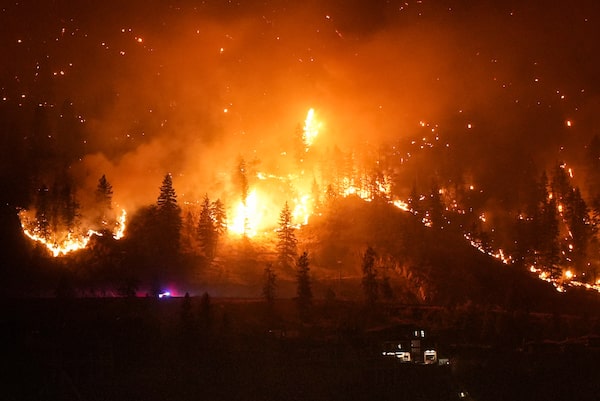
The McDougall Creek wildfire burns on the mountainside above a lakefront home, in West Kelowna, B.C., on Aug. 18, 2023.DARRYL DYCK/The Canadian Press
Elliott Cappell is PwC Canada’s national climate change leader, and he supports the Canadian Sustainability Standards Board as a climate change subject matter expert. He previously served as Toronto’s chief resilience officer.
My father, a native Nova Scotian, likes to say that “if you don’t like the weather in Halifax, just wait 15 minutes.” The same thinking can be applied to the climate change issue in Canada today. Conditions are changing quickly, and the past may not be a good predictor of the future.
It may seem obvious what looms for us with Canada’s warmest winter on record now over. The World Meteorological Organization confirmed in its recent State of the Global Climate that 2023 was the warmest year on record by far, and the National Oceanic and Atmospheric Administration found that there is a one-in-three chance that 2024 will be even hotter. So wildfires and drought, and the pain and challenges they bring, seem likely this summer.
But in what may feel like a paradox, those conditions can also increase the risk of flooding, since drier and hotter conditions harden the ground, which then absorbs less water. These conditions may also lead to unwelcome short-term changes in nature and biodiversity, such the increase in ticks in Ontario, which are thriving after the warmer winter.
In short: we have to expect the unexpected.
Here’s one trend that does look like a safe bet, though: We, and businesses in particular, are increasingly buying into climate adaptation. Business action on climate adaptation has consistently lacked urgency, both in Canada and globally. But in discussions with business leaders, I have observed a recent shift by which corporate climate action is driven by an unexpected source: customers who want to adapt. Farmers, for instance, are driving demand for drought-resistant crops, new insurance products and AI-powered weather forecasting. Other less inspiring but still relevant examples come from companies responding to the fivefold increase in sales of air purifiers in the northeast U.S. during last summer’s Canadian wildfires, or preparing to meet the perennial growth in demand for cooling devices such as air conditioners and fans.
In years past, it felt taboo to talk about making money from climate change adaptation. Climate activists often painted that as capitalizing on disasters, or of taking attention away from the “more important” challenge of reducing emissions. But now, businesses in Canada and around the world appear ready to buy into adaptation opportunities, particularly in sectors most affected by the physical risks of climate change, such as insurance, infrastructure, engineering, natural resources and, of course, agriculture.
This spring and summer, then, offer a bellwether for how Canadian businesses are thinking about climate adaptation, particularly as the Canadian Sustainability Standards Board seeks input on its proposed approach for organizations’ disclosure of sustainability-related information. The consultation, which ends in June, asks how Canadian businesses are planning to assess their own climate resilience, and it carries real weight; the Canadian Securities Administrators, which govern federal and provincial regulation of capital markets, stated the ensuing report may “inform revisions to our proposed climate-related disclosure rule.”
The optimistic view is that once Canadian businesses are regulated to assess and disclose their climate risks and opportunities, they will face pressure to act. Rules and regulation will help, but those need to be coupled with management and boards improving their capacity to truly understand physical risk.
It is entirely plausible that global warming will continue to rise past the Paris Agreement’s 1.5 C target – and possibly well past. A world that is two, three or even four degrees warmer is plausible within 50 years; to put that into context, after the last ice age, the world warmed at least 4 degrees over 5,000 years. So the changes for customers, markets and supply chains could be both significant and fast. To ensure that businesses’ disclosures are meaningful, helping them understand physical risk is an urgent priority.
Governments, on the other hand, are facing a complex spring and summer on the climate file. The late Honourable John Godfrey explained climate action as a “whole of government” problem, requiring co-ordination across many ministries or departments, and also a “whole of governments” problem, demanding collaboration between municipalities, provinces and territories, and the federal government. But the recent political debate on carbon pricing is just the latest example of the complexities facing a whole-of-governments collaboration on climate change in Canada today.
Like the weather in Halifax, however, we could see some quick shifts here, too. The carbon pricing debate has been playing out over the winter, when Canadians pay higher natural gas bills; the tenor of that discussion could change once we’re in a season of wildfires or water shortages. These potential changes in discourse are likeliest to happen at the municipal or regional level, as people living in cities have come to understand that they are on the front lines of climate change and its physical consequences, and better understand that those costs are linked to the need to decarbonize. For example, the City of Toronto just passed a mandate for “renewed focus and coordinated approach to building resilience to a changing climate,” alongside its plan to reduce emissions.
Saying that we should expect the unexpected may seem like a less-than-bold forecast on my part. But the months ahead are likely to feature a combination of accelerating warming, increased climate action from business, and shifts in both consumer and public sentiment. And while wildfires, droughts and floods are certainly reasonable expectations, it is time for us to prepare as best we can for the uncharted waters we are in.